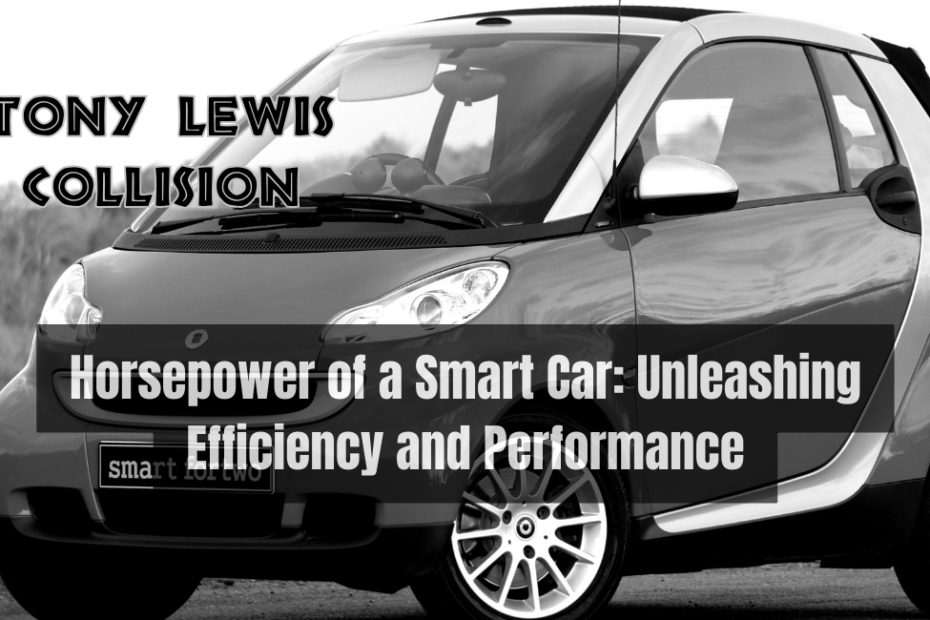Power and performance have always been top of mind for auto enthusiasts regarding vehicles. Although “horsepower” is frequently used in high-performance automobiles, it’s equally crucial to comprehend how it relates to smart cars. In this article, we’ll investigate the world of smart cars and the idea of horsepower in these highly developed automobiles. Join us as we reveal the tricks to smart cars’ effectiveness and performance.
Understanding Horsepower
The rate of work that is being accomplished is typically measured in horsepower, which is a unit of power. It assesses the engine’s capacity to generate force while also functioning successfully within the confines of the vehicle’s architecture. It was a phrase that was used to describe the power output of internal combustion engines before the introduction of smart cars, but since then, the definition of the term has been expanded to cover electric motors as well. Before smart cars were introduced, the term was used to describe the power output of internal combustion engines.
The Evolution of Smart Cars
By providing creative solutions for urban mobility, smart cars have transformed the automobile sector. These little cars incorporate the latest technologies to offer comfort, connectivity, and sustainability. Smart cars have significantly increased in popularity as the need for environmentally friendly transportation develops because of their effective design and minimal environmental impact.
Powering Smart Cars: Electric Motors
Electric motors are used mostly in smart automobiles. Electric motors run on power stored in rechargeable batteries, unlike conventional combustion engines. Smart cars may now run entirely on electricity instead of fossil fuels, which helps to create a future that is greener and more sustainable. Instantaneous power delivery from electric motors allows for excellent acceleration and a comfortable driving experience.
The Relationship Between Horsepower and Performance
Horsepower is a key factor in defining the performance capabilities of smart cars. Faster acceleration made possible by more horsepower enables smart automobiles to maneuver city streets with agility. Additionally, it helps the car reach faster top speeds, increasing its adaptability on highways. It’s crucial to remember that smart automobiles strike a balance between performance and sustainability by giving efficiency precedence over raw power.
Acceleration and Top Speed of Smart Cars
Smart automobiles shine in urban settings, where rapid acceleration and maneuverability are crucial. Despite their tiny size, smart cars’ excellent acceleration is a result of the electric motors’ quick torque delivery. Smart cars are intended for effective commuting rather than high-speed performance, even though they might have lower top speeds than conventional sports cars.
Optimizing Horsepower in Smart Cars
Manufacturers concentrate on several variables to maximize horsepower in smart automobiles. Modern battery technology, intelligent power management systems, and efficient motor design are essential to maximize performance while minimizing energy consumption. Smart automobiles may decrease drag and boost overall economy by utilizing lightweight materials and aerodynamic designs, ensuring that every horsepower is used efficiently.
The Role of Aerodynamics in Enhancing Efficiency
Aerodynamics is essential to the design of smart cars since it directly impacts effectiveness and performance. Drag is decreased with the use of streamlined exteriors, aerodynamic body shapes, and improved airflow around the vehicle. Smart automobiles may utilize their available horsepower more effectively by reducing air resistance, increasing their range, and improving overall performance.
The Impact of Weight on Horsepower
Any vehicle’s performance, including the performance of smart cars, is greatly influenced by its weight. Less horsepower is needed to produce the desired performance the lighter the car is. Aluminum and carbon fiber are two lightweight materials that smart vehicle makers use to minimize weight while preserving structural integrity. In addition to improving performance, this weight reduction also increases energy efficiency and increases the vehicle’s range.
Smart Cars and Fuel Efficiency
As it immediately impacts their running expenses and environmental impact, fuel efficiency is crucial for smart car owners. Smart cars provide a remarkable energy economy by using electric drivetrains. They use regenerative braking systems to preserve energy that would otherwise be lost during deceleration. These energy-saving measures help smart cars operate more efficiently overall, together with intelligent power management.
The Future of Smart Car Horsepower
Smart car horsepower appears to have a bright future as technology develops further. Power management systems are being further developed, electric motors are being optimized, and battery technology is improving. These developments will likely result in even more effective and potent smart cars, making them a more alluring option for commuters who are concerned about the environment.
Conclusion
In conclusion, smart cars are revolutionizing the automotive sector with their effective and sustainable design. To balance performance and sustainability, smart cars use horsepower, which makes it possible for them to function well in urban settings. Smart cars are getting more powerful and efficient every year thanks to aerodynamics, weight reduction, and electric motor technology improvements.
Frequently Asked Questions (FAQs)
Q: Are smart cars less powerful than conventional cars?
A: Although smart cars emphasize efficiency above raw power, they deliver excellent performance for city commuting.
Q: Can smart cars achieve high top speeds?
A: Smart cars are made to perform best in urban settings rather than on high-speed roads. Thus they may not have the same top speeds as sports cars.
Q: How do smart cars contribute to sustainability?
A: Smart cars promote energy economy and have zero emissions thanks to their electric drivetrains, which lessen their environmental impact.
Q: Are smart cars cost-effective to operate?
A: Smart cars’ lower running costs, which include lower fuel costs and potential tax advantages, make them potentially cost-effective.
Q: What does the future hold for smart car horsepower?
A: With continual improvements in power management and battery technology, smart automobiles will become more potent and efficient in the future.
Learn more: How Long is a Crew Cab Long Bed Truck?
